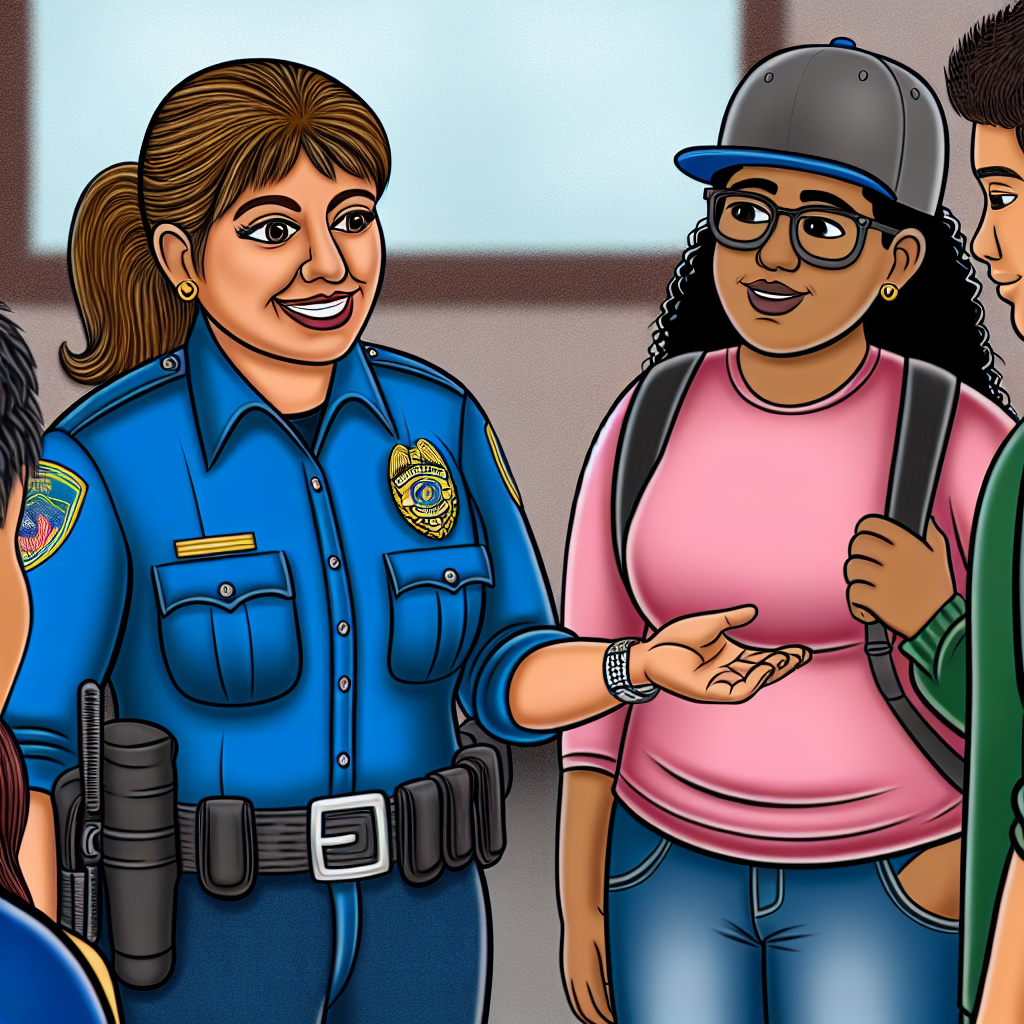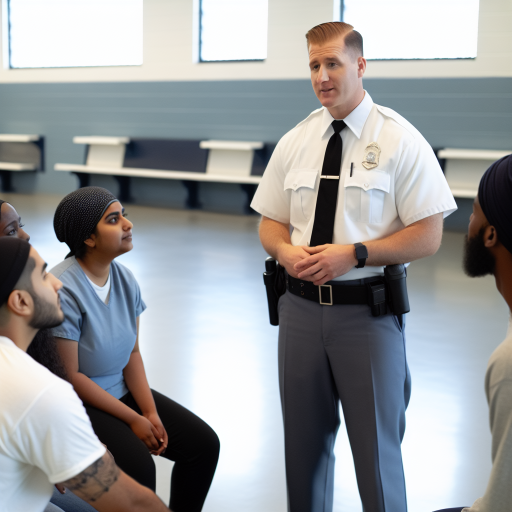Ensuring the safety and security of students and staff in schools is paramount.
School resource officers play a vital role in this aspect.
They not only focus on maintaining order and enforcing laws but also on building positive relationships with students.
This helps in preventing potential threats and promoting a safe learning environment.
Training and Certification
School resource officers must undergo specific training and certification requirements to serve in schools.
The training typically includes courses on school law, conflict resolution, adolescent development, and crisis intervention.
Certification may involve passing exams, completing field training, and meeting state or departmental requirements.
Ongoing training is essential to keep officers updated on best practices and protocols.
Continuous education ensures that officers have the skills and knowledge to handle any situation effectively.
Regular training also helps SROs stay informed about changes in laws and policies affecting schools.
It is crucial for SROs to have the necessary training to build positive relationships with students.
Well-trained officers are better equipped to de-escalate conflicts and prevent violent incidents in schools.
Training in cultural competence and diversity is vital for understanding and respecting the community they serve.
SROs should also receive specialized training in crisis management and mental health first aid.
Importance of Ongoing Training
Ongoing training ensures that SROs stay current on the latest techniques and strategies for school safety.
Regular training helps officers adapt to the changing needs of students and schools.
It provides opportunities for SROs to enhance their communication and de-escalation skills.
Ongoing training reinforces the importance of maintaining a positive and supportive presence on campus.
Continuous education allows officers to collaborate with school staff and community partners effectively.
Training refreshers keep officers sharp and ready to respond to emergencies quickly and efficiently.
Transform Your Career Today
Unlock a personalized career strategy that drives real results. Get tailored advice and a roadmap designed just for you.
Start NowIt enables SROs to identify and address emerging threats or concerns within the school environment.
Ongoing training also emphasizes the importance of fostering a safe and inclusive school climate.
It helps officers recognize signs of mental health issues and intervene appropriately when necessary.
Regular training ensures that SROs are prepared to handle a variety of scenarios with professionalism and empathy.
Effective Communication Skills
Strong communication skills are essential for school resource officers in order to effectively interact with students, staff, and parents.
Communication is key in building trust and maintaining positive relationships within the school community.
- Listening Skills: School resource officers should actively listen to the concerns and needs of students, staff, and parents.
- Verbal Communication: Clear and concise verbal communication is crucial for delivering instructions, providing information, and addressing issues promptly.
- Non-Verbal Communication: Body language and facial expressions also play a significant role in communication.
Importance of De-escalation Techniques
De-escalation techniques are vital for school resource officers when dealing with potentially volatile situations.
These techniques focus on resolving conflicts and disputes peacefully, without the need for escalation or physical force.
- Active Listening: By actively listening to the concerns of all parties involved, school resource officers can better understand the root cause of the conflict and work towards a resolution.
- Empathy and Understanding: School resource officers should demonstrate empathy and understanding towards students, staff, and parents.
- Conflict Resolution Skills: It is important for school resource officers to have the skills to mediate conflicts and find mutually acceptable solutions.
Effective conflict resolution can prevent further escalation.
Effective communication skills and de-escalation techniques are essential qualities for school resource officers to possess.
By mastering these skills, officers can create a safe and positive environment within schools and foster positive relationships with the school community.
Learn More: Language Skills Beneficial for CBP Officers
Understanding School Policies and Procedures
Understanding school policies and procedures is crucial for school resource officers for the following reasons:
- Enhances Communication
- Makes Procedures Easier
- Maintains Order
- Promotes Accountability
- Ensures Fairness
- Prevents Misinterpretation
Knowledge of policies allows officers to effectively communicate expectations to students and staff.
Enforcement is smoother when officers can refer to specific policies and procedures.
Officers can hold individuals accountable for their actions based on established rules.
By following policies, officers ensure that discipline is meted out fairly to all.
Clarity in policies reduces the chances of misinterpretation by students or staff.
Effective Enforcement of Rules and Regulations
When school resource officers are well-versed in school policies and procedures, they can enforce rules in the following ways:
- Consistent Application
- Swift Interventions
- Prevention of Violations
- Effective Communication
Officers can apply rules consistently, creating a sense of fairness and predictability.
Transform Your Career Today
Unlock a personalized career strategy that drives real results. Get tailored advice and a roadmap designed just for you.
Start NowKnowledge allows for quick interventions when rules are broken, minimizing disruptions.
Knowing policies helps officers prevent violations before they occur through proactive measures.
Officers can communicate policies clearly, ensuring understanding among students and staff.
In essence, a thorough understanding of school policies and procedures equips school resource officers with the tools necessary to maintain a safe and conducive learning environment.
Find Out More: How to Become a Federal Probation Officer
One key quality of effective school resource officers is their understanding of youth development.
This knowledge is crucial for building relationships with students and providing the necessary support when needed.
Importance of Understanding Adolescent Development
- Understanding adolescent development helps officers recognize the challenges and issues students may face.
- It allows officers to empathize with students and approach them with compassion and understanding.
- Officers can tailor their interactions and responses based on the developmental stage of each student.
Connecting with Students on a Personal Level
- Having an understanding of youth development enables officers to build trust and rapport with students.
- Officers can engage in meaningful conversations and offer guidance that resonates with students’ experiences.
- By connecting on a personal level, officers can create a safe and supportive environment for students.
Providing Support When Needed
- Knowledge of adolescent development allows officers to recognize signs of distress or behavioral changes in students.
- Officers can intervene early and offer appropriate support, whether it’s counseling, mediation, or referral to other resources.
- By being proactive and responsive, officers can help students navigate challenges and make positive choices.
An understanding of youth development is a vital quality for school resource officers.
It enhances their ability to connect with students, provide support, and create a safe and nurturing environment within the school community.
Discover More: Role of Language Skills in Counterterrorism Specialist Work
Building Trust and Rapport
Building trust and rapport with students is a fundamental aspect of being an effective school resource officer.
By creating a safe and welcoming environment, officers can foster positive relationships with students and promote a sense of security within the school community.
Importance of Trust and Rapport
- Enhances communication between officers and students
- Strengthens the bond of trust within the school
- Promotes a sense of safety and security
- Encourages students to seek help when needed
- Reduces conflicts and improves conflict resolution
Strategies for Building Trust
- Listen actively to students’ concerns
- Show empathy and understanding
- Be approachable and friendly
- Respect students’ backgrounds and experiences
- Engage in positive interactions outside of disciplinary actions
Strategies for Building Rapport
- Participate in school events and activities
- Engage in casual conversations with students
- Provide mentorship and support
- Be consistent and reliable in interactions
- Build relationships based on mutual respect
The ability of school resource officers to build trust and rapport with students is essential in creating a positive and safe learning environment.
By implementing strategies to connect with students and establish positive relationships, officers can contribute to the overall well-being of the school community.
Uncover the Details: Understanding Jurisdiction of Sheriffs

Key Points in Crisis Response by School Resource Officers
When it comes to crisis response and intervention, school resource officers play a crucial role.
They ensure the safety and well-being of students in challenging situations.
Immediate Action
In crisis situations, school resource officers must act swiftly.
They should understand emergency protocols to ensure a quick response.
Calm and Composed Demeanor
During crises, officers must maintain a calm demeanor.
Transform Your Career Today
Unlock a personalized career strategy that drives real results. Get tailored advice and a roadmap designed just for you.
Start NowThis control helps reassure students and prevent panic.
Training and Preparation
Ongoing training in crisis response is essential for resource officers.
Training should include scenarios like active shooter situations and natural disasters.
Communication Skills
Effective communication is vital during a crisis.
Officers must provide clear instructions to ensure an efficient response.
Support and Empathy
Beyond immediate actions, officers should offer emotional support.
Building trust with students is crucial in times of distress.
Collaborative Approach
Officers should collaborate with school administrators and mental health professionals.
This teamwork ensures a comprehensive crisis response plan.
By emphasizing these key qualities, school resource officers can effectively respond during a crisis.
They play a critical role in safeguarding the school community.
Collaborative Approach
Benefits of school resource officers working collaboratively with school administrators, teachers, and mental health professionals:
- Enhanced communication and sharing of important information.
- Improved coordination of efforts to address safety concerns.
- Increased effectiveness in responding to incidents and emergencies.
- Development of comprehensive strategies for student support.
- Creation of a unified front in promoting a positive school environment.
Importance of teamwork in addressing safety concerns and supporting the overall well-being of students:
- Strength in numbers to tackle complex issues and challenges.
- Diverse perspectives leading to innovative and holistic solutions.
- Pooling of resources and expertise for efficient responses.
- Enhanced trust and relationships among stakeholders for long-term success.
- Promotion of a culture of collaboration and shared responsibility.
Key Qualities of Effective School Resource Officers
Effective school resource officers possess key qualities that enable them to fulfill their roles successfully.
- Comprehensive training in law enforcement and youth interaction
- Strong communication skills to engage with students, staff, and parents
- Thorough knowledge of school policies and procedures
- Understanding of youth development and behavior
- Ability to build trust and rapport with students
- Proficiency in crisis response and de-escalation techniques
- Emphasis on a collaborative approach to address safety concerns
It is crucial to recognize the vital role that school resource officers play in creating a safe and supportive learning environment for students.
Their presence enhances security and promotes positive relationships between law enforcement and the school community.
By embodying these qualities, school resource officers contribute significantly to the overall well-being and success of both students and schools.
Additional Resources
Why Stress Management Skills Are So Important for Police Officers …




